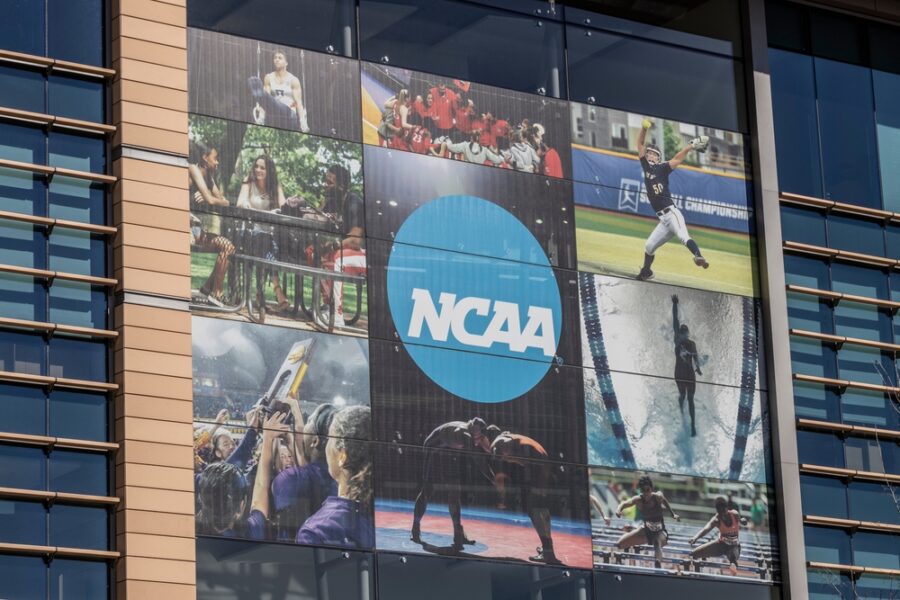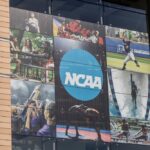NCAA moves towards allowing college athletes to bet on professional sports

The NCAA passed a proposal on Wednesday that would see the organization scrap a long-held rule preventing student athletes and staff from betting on professional sports.
This rule change only applies to Division I athletes, after the Administrative Committee approved it.
Divisions II and III are expected to consider the proposal when their meetings are scheduled at the end of October. If all three divisions approve the rule change, it will begin on November 1.
The rule will only apply to professional sports, with wagering on collegiate sports strictly forbidden.
The decision comes after a tumultuous period since sports gambling has become legal, making the rule difficult to enforce.
Recently, there have been a number of investigations into student athletes accused of gambling, including one that resulted in a lifetime ban for three former Fresno State men’s basketball players, who were discovered to be wagering on their own games.
Josh Whitman, athletics director at Illinois and chair of the committee, stressed this rule change is not an endorsement of sports gambling.
He said, “The Administrative Committee was clear in its discussion today that it remains concerned about the risks associated with all forms of sports gambling but ultimately voted to reduce restrictions on student-athletes in this area to better align with their campus peers.”
Verticals:
Sectors:
Topics:
Dig Deeper
The Backstory
Inside the NCAA’s pivot on athlete betting
The NCAA’s move to relax its prohibition on athlete betting is the culmination of months of incremental steps and rising pressure as legal sports wagering spread across the country. The Division I Administrative Committee set the tone by approving a proposal that would let Division I athletes and staff wager on professional sports while keeping a ban on betting on college contests. The shift, outlined in a report on how the NCAA moves towards allowing college athletes to bet on professional sports, reflects a bid to align policy with campus norms while drawing a bright line around collegiate events. If Division II and III ultimately follow suit at meetings slated for late October, the change could take effect Nov. 1, reshaping compliance programs just as basketball season begins.
The move follows a spring and summer of discussion. The Division I Council first signaled openness to the change when it recommended allowing college athletes to bet on pro sports, arguing the NCAA’s blanket ban was crafted in an era before widespread legalization. Council chair Josh Whitman framed the rethink as recognition that rules should reflect the difference between wagering on professional leagues and on campus competitions where athletes have direct influence. The underlying principle remains intact: no betting on college sports by those inside college athletics.
What has to happen next
The strategy depends on a coordinated, three-division process. Division I’s administrative step is not the final word. Governing bodies for Division II and III will consider the same framework in late October. The Division I Council must also formalize adoption in October, according to the account of how the council advanced its recommendation. Only after those approvals would a Nov. 1 start date be viable. That timeline is tight. Compliance staffs would need to update education modules and monitoring protocols before college basketball tips off and football enters rivalry week.
The NCAA’s stepwise approach follows its broader integrity strategy. The association extended its long-term data partnership with Genius Sports through 2032 to lock in official data distribution and integrity services. The deal, detailed in the report that the NCAA announces extended partnership with Genius Sports, gives sportsbooks access to sanctioned data feeds and an Authorized Gaming Licensee program while expanding tools such as NCAA LiveStats and the GeniusIQ analytics platform for schools. That infrastructure supports the compliance shift by improving detection of suspicious activity across tens of thousands of games annually.
Why integrity risks remain central
The NCAA’s recalibration does not soften its stance on betting on college games or sharing inside information. Recent cases show why. Enforcement actions have included a lifetime ban for three former Fresno State men’s basketball players accused of wagering on their own games, underscoring the stakes described in the analysis of the Division I betting proposal. As legal markets have grown, policing has become more complex, with athletes more visible and more reachable on social media.
The association and its allies have tried to narrow the most toxic incentives. In April, the NCAA and Genius Sports added a guardrail to block negative player props from regulated markets tied to NCAA data. The clause, disclosed when athletes were promised protection from negative prop bets, targets wager types that can fuel harassment of individual players. The NCAA has urged states to restrict college prop bets, and more than half of legalized jurisdictions have adopted limits. Still, compliance officials say enforcement is challenging when offshore operators offer prohibited markets.
Education is a linchpin. An NCAA study this year found sports wagering is common among students and that targeted training can improve behavior while harassment of athletes remains prevalent online. The findings, summarized by the association’s media center, show why the NCAA is leaning on prevention alongside rules. The report on how education shows promise in changing sports betting behaviors indicates awareness campaigns can blunt risky conduct but cannot eliminate it.
Backlash and the optics of a divided rule
Opening professional betting to athletes has drawn swift pushback from responsible gambling advocates and some administrators worried about mixed messages. Critics argue that even a narrow policy could blur lines for 18- to 22-year-olds navigating name, image and likeness deals, new income and peer pressure. The skepticism is detailed in coverage of how the NCAA faces backlash over the sports betting proposal. Opponents fear exposure to legal pro betting will normalize wagering and increase the risk that a subset of athletes drift into illegal sites or cross into prohibited college bets.
Supporters counter that the current ban is out of step with the legal market and social norms on campus. They argue a clear pro-versus-college divide is enforceable and fairer, given that nonathlete students can already wager on pro leagues in many states. Whitman has said the rethink reflects how members see “potential distinctions between betting on professional vs. collegiate sports,” a theme that runs through the reports on both the council’s recommendation and the Administrative Committee’s action.
The harassment problem and new guardrails
Beyond integrity, harassment has become a pressing risk factor. Players have reported a steady drumbeat of direct messages and payment requests after games from losing bettors. In response, the NCAA teamed with Venmo to create a hotline, bolster account security education and monitor social trends around marquee events. The partnership, outlined in the report that the NCAA and Venmo partner to address harassment of athletes, targets conduct that ranges from nuisance requests to solicitation of insider information. PayPal, Venmo’s parent, said abusive activity is infrequent but unacceptable and subject to enforcement under platform rules.
The NCAA also leaned on its Genius Sports extension to add friction where bettors can most directly impact players. The block on negative props aims to reduce incentives to attack individual athletes online after a missed free throw or turnover. As documented in the feature on protecting athletes from negative props, abuse spikes during March Madness and disproportionately targets women players. These interventions complement state-level limits and reflect an attempt to curb the worst behavior even as regulated betting becomes more entrenched.
Whether those steps will be enough if the pro-betting carve-out takes effect is the open question. Education campaigns and platform partnerships are designed to scale, but the enforcement edge still rests on clarity. The NCAA is betting that a clear no-college-bets rule paired with broader integrity tools can manage the risk. Backers say it modernizes policy without compromising competition. Detractors worry the culture shift will outpace the guardrails. The next month of votes will decide which side sets the new baseline.





